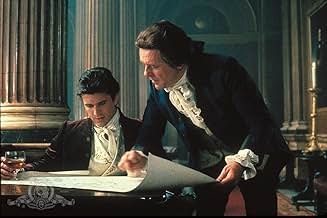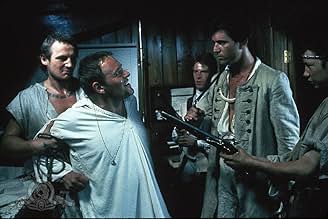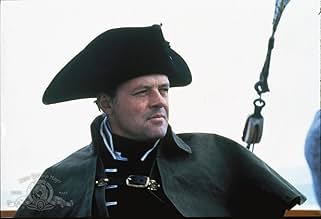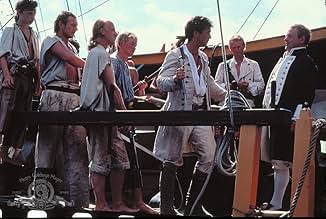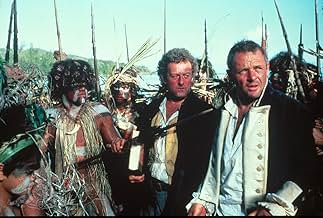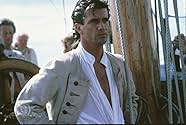Fed up with their Captain's harsh discipline, a sailing ship's crew decides to take action.Fed up with their Captain's harsh discipline, a sailing ship's crew decides to take action.Fed up with their Captain's harsh discipline, a sailing ship's crew decides to take action.
- Director
- Writers
- Stars
- Awards
- 2 nominations total
- Young
- (as Philip Davis)
- Director
- Writers
- All cast & crew
- Production, box office & more at IMDbPro
Featured reviews
The Bounty has a lot going for it. It is based on Hough's book, perhaps the best account of the mutiny. The screenplay was written by Robert Bolt, who also wrote such classics as Lawrence of Arabia, Doctor Zhivago, A Man for All Seasons, and Ryan's Daughter. His work shows in the complex, fully realized characters that are the center of this story. And those characters are brought to life by an amazingly strong cast - Anthony Hopkins (an Oscar for Silence of the Lambs) as William Bligh, Mel Gibson (an Oscar for directing Braveheart) as Fletcher Christian, Daniel Day-Lewis (an Oscar for My Left Foot) as John Fryer, and Liam Neeson (nominated for an Oscar for Schindler's List) as Churchill. Of course, none of these actors were famous yet when they performed in The Bounty. Two film giants, Laurence Olivier and James Fox, make cameo appearances as Admiral Hood and Captain Greenham, respectively, members of the Court Martial that tries Bligh on his return to Britain. The rest of the cast is not so well known, but they are all excellent.
Anthony Hopkins' Bligh is definitely not a villain, but he is at best a flawed hero. Hopkins, as he always does, makes the character of Bligh completely believable. He is a superb seaman and a man of unquestioned courage. He is also a very capable leader in the right circumstances, but he has a quick temper and a tendency to shift responsibility from himself to others. And he is an ambitious man with no connections or influence in a society where those weigh as heavily as skill and competency. When the chance to make a name for himself seems to be drifting from his grasp, his frustration and anger is turned on those around him. Hopkins never seems to be acting. He becomes Bligh.
Mel Gibson was a bigger name actor than Hopkins even when this movie was made, but it is obvious that he is not quite in the same league. His is the weakest performance of the primary actors, but that's still not bad considering the caliber of this cast. He does a nice job of letting Fletcher Christian evolve from a rather shallow, genial fop into a tortured leader of a mutiny. He seems to work a little too hard at being the tormented soul during the mutiny but it's a good overall performance and does not detract from the story.
The Bounty does an especially fine job of showing the Tahitians as real people. The costumes and behavior feel completely authentic. Wi Kuki Kaa as King Tynah, although not on screen for very long, manages to create a fully realized and sympathetic character. Tevaite Vernette as Mauatua, Christian's Tahitian wife, is lovely but a bit bland at first. Once the mutineers have left Tahiti on the Bounty, she develops into a stronger character who backs Christian when the other mutineers turn against him.
Roger Donaldson's direction is deliberate. He builds the story slowly and purposefully, piling small scenes one atop another to build a foundation for the intense, emotion-laden scenes of the mutiny and its consequences. The pace may be too slow for modern viewers grown accustomed to the quick-cut editing of contemporary action/adventure movies, but the pay-off is worth the effort for those with some patience.
The Bounty is a beautiful movie. Wonderful cinematography by Arthur Ibbetson makes full use of the sea and tropical islands. There's nothing quite like the appeal of a full rigged ship under sail and we get plenty of the Bounty - brilliant, sun-drenched shots, towering waves and howling winds around the Horn, silhouettes of the ship against color saturated evening skies, and more.
Of the three movies I've seen based on the story of the mutiny on the Bounty, this is my favorite. It is more historically accurate in its presentation of the events, the characters, the ship, and the Tahitian people and culture. A brilliant screen play and fine performances from an exceptional cast are the core of the movie. It is well crafted and beautifully filmed. The pacing may be slow for some, but for anyone interested in this famous mutiny or sea stories, in general, it is highly recommended.
This is filled with great actors. They are all good. The older versions have Bligh as the villain and Christian as the hero. This one isn't quite so simplistic. Christian is more of a blank for the most part while Bligh tries to be sympathetic as much as he's allowed. Hopkins isn't doing a crazed dictator as usual but a needy outsider. I'm not sure about the constant back and forth between the time periods. The later time period adds very little to the movie. It is far too long already. The movie needs to get to Tahiti earlier. The turn in Tahiti is terrific with Hopkins finding another gear. The film looks beautiful. If Roger Donaldson could push the pace more and reduce the over 2 hour running time, this could be an even better film.
Unlike some of the previous comments for this film I think it is pretty loyal to the true historical facts of the real mutiny. Alright, there are a few minor changes to fact, but nothing that radically alters the story. Basically Bligh was a very able and fair captain, who was let down by incompetent officers. Bligh was no more a monster than any other Royal Navy captains, the difference was other Royal Navy Captains had able commissioned officers and a squad of marines to back up their authority. Bligh was on his own, because the admiralty insisted on saving money on the bread-fruit expedition by giving Bligh a small ship and no officers. (All the officers on board were non-commissioned warrant officers, who were not employed by the Royal Navy but were in it for their own advancement, Blight was the only Royal Navy officer). This is what ultimately led to the mutiny. Bligh had no one he could rely on to back up his orders from the Admiralty. Bligh was actually an exponent of modern thinking, and treated his men with much more humanity than other Royal Navy Captains. He had learnt his trade from sailing under Captain Cook.
I think Hopkins manages to capture this in his performance. Bligh was a professional man, who grew increasingly frustrated by the incompetence and laziness of his officers. Hopkins manages to convey this sense of increasing irritation brilliantly. He felt particularly let down by Fletcher Christian, who was his friend and whom he had personally advanced up the ranks. He expected Fletcher to back up his orders, but Fletcher was more interested in his own pleasure with the Tahitian women.
On the journey out the crew were actually very happy and contented, but the trouble began when the crew began to experience the liberties and freedoms of Tahitian life, and they did not want to leave it. Bligh had to force the men to go back to their duty, and instead of having officers to back him up, the officers took the side of the men.
I think the script of this film captures the true story quite well. I saw the Clark Gable version of the story many years ago, and the only thing I remember is the portrayal of Bligh as an irrational monster, with none of the reasons behind his anger explained. In this version I feel Hopkins is more like the real Bligh. An able commander trying to carry out his orders, but let down by those around him.
The confrontation between Bligh and Christian in the captain's cabin the day before the mutiny is one of my favourite movie scenes of all time. Hopkins performance of the captain at the end of his patience is just outstanding. `Oh there are rumblings are there?'. Superb!
The only down side to this film is Mel Gibson. I can't stand the sight of him! Mind you, even he manages to pull of a good performance.
The film ends quite abruptly, with a lot of loose ends. The most fascinating parts of the true story come after the end of the film. I guess the time constraints of the film mean they had to concentrate on just the story of the mutiny.
The mutineers set up a colony on Pitcairn, and ended up all murdering each other until only one survived (Jack Adams). Those that stayed on Tahiti were captured two years later by HMS Pandora which had been dispatched after Bligh got back to England. This ship rounded up about 16 mutineers, and on the way home the Pandora hit a reef off Australia and sunk. The crew had to make an open boat journey to Coupang, the same port that Bligh's life boat had arrived at two years earlier!!
Meanwhile Bligh was promoted and sent off on another Breadfruit exhibition to Tahiti, this time the Admiralty gave him commissioned officers and a squad of marines. This mission succeeded.
When the Breadfruit plants finally reached the slave colonies in the West Indies, the slaves refused to eat the fruit as they disliked the taste. That's irony for you!
Bligh was a very good seaman, an excellent navigator, and a firm but fair ship's captain. There were far worse than him in the Royal Navy. His 3,500+ mile voyage in a small open boat with his loyal crew members has never been bettered.
After the slander of the two previous films in the 30's and 60's, this film gives a far more accurate and sympathetic portrayal of Bligh, and Anthony Hopkins is excellent as always.
Did you know
- TriviaMel Gibson was disappointed with his performance and the finished movie. He later said of the movie, "I think the main problem with that film was that it tried to be a fresh look at the dynamic of the mutiny situation, but didn't go far enough. In the old version, Captain Bligh was the bad guy and Fletcher Christian was the good guy. But really Fletcher Christian was a social climber and an opportunist. They should have made him the bad guy, which indeed he was. He ended up setting all these people adrift to die, without any real justification. Maybe he'd gone island crazy. They should have painted it that way. But they wanted to exonerate Captain Bligh while still having the dynamic where the guy was mutinying for the good of the crew. It didn't quite work."
- GoofsWhen Bligh, Fryer and Christian are in Bligh's home planning the voyage, Bligh refers to a route that would take them around the coast of 'Australia'. But at the time of the Bounty's voyage in 1789 what we now know as Australia was instead universally called New Holland - a name which also appears on Bligh's map and which he later uses after being cast adrift. 'Australia' only came into common usage in the early 19th century; it gained official status in 1824.
- Quotes
Lt. William Bligh: We are still faced with a long, hard voyage. I mean to make good use of every hour of sailing time, and to assist me in this, I am replacing Mr. Fryer with Mr. Christian, who will now act as executive second in command, with the rank of Acting Second Lieutenant...
[Fryer walks away]
Lt. William Bligh: Mr. Fryer, come back here.
[shouts after Mr. Fryer, who is continuing to walk away]
Lt. William Bligh: Mr. Fryer, sir! Come back here!
[Mr. Fryer returns; Bligh continues, quietly]
Lt. William Bligh: I will dismiss when I have done with you, sir. Do you hear me?
John Fryer: This is an outrage!
Lt. William Bligh: Mr. Fryer!
John Fryer: In all my years at sea...
Lt. William Bligh: Your "years at sea"? Good Lord, man! If I'd known your nature, I would not have accepted you as boatswain of a river barge.
John Fryer: Must I suffer this before the men?
Lt. William Bligh: You will suffer my correction whenever you're at fault, sir!
John Fryer: What fault?
Lt. William Bligh: [shouts] God damn your eyes, man! You turned your back on me!
John Fryer: Well for that, I apologize.
Lt. William Bligh: Very well.
John Fryer: But I protest.
Lt. William Bligh: You protest, do you?
John Fryer: I am Master of the Bounty!
Lt. William Bligh: [shouts] And I, sir, am *Commander*! By law! I am the first! Do you understand? God damn your hide! And now you may dismiss, sir!
- Alternate versionsGerman version misses ca. 26 minutes.
- ConnectionsFeatured in The Making of 'The Bounty' (1984)
Details
- Release date
- Countries of origin
- Language
- Also known as
- The Bounty
- Filming locations
- Moorea, French Polynesia(South Seas locations)
- Production companies
- See more company credits at IMDbPro
Box office
- Budget
- $25,000,000 (estimated)
- Gross US & Canada
- $8,613,462
- Opening weekend US & Canada
- $2,622,306
- May 6, 1984
- Gross worldwide
- $8,613,462
- Runtime2 hours 12 minutes
- Color
- Sound mix
- Aspect ratio
- 2.39 : 1
Contribute to this page



